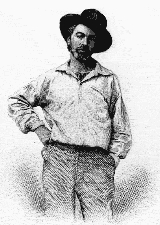
Walt Whitman
(1819–1892). Though the first edition was published in 1855, Whitman spent his entire life writing Leaves of Grass, revising it in several editions until his death. Among the poems in the collection are "Song of Myself
", "I Sing the Body Electric
", and in later editions, Whitman's elegy
to the assassinated
President
Abraham Lincoln
, "When Lilacs Last in the Dooryard Bloom'd
".
This book is notable for its delight in and praise of the senses during a time when such candid displays were considered immoral.
Ever and ever yet the verses owning — as, first, I here and now Signing for Soul and Body, set to them my name, Walt Whitman![]()
One's-self I sing, a simple separate person, Yet utter the word Democratic, the word En-Masse. …The Female equally with the Male I sing. Of Life immense in passion, pulse, and power, Cheerful, for freest action form'd under the laws divine, The Modern Man I sing.![]()
I too haughty Shade also sing war, and a longer and greater one than any, Waged in my book with varying fortune, with flight, advance and retreat, victory deferr'd and wavering, (Yet methinks certain, or as good as certain, at the last,) the field the world, For life and death, for the Body and for the eternal Soul, Lo, I too am come, chanting the chant of battles, I above all promote brave soldiers.![]()
Chanter of Personality, outlining what is yet to be, I project the history of the future.![]()
To thee old cause! Thou peerless, passionate, good cause, Thou stern, remorseless, sweet idea, Deathless throughout the ages, races, lands, After a strange sad war, great war for thee, (I think all war through time was really fought, and ever will be really fought, for thee,) These chants for thee, the eternal march of thee.![]()
All space, all time, (The stars, the terrible perturbations of the suns, Swelling, collapsing, ending, serving their longer, shorter use,) Fill'd with eidolons only. The noiseless myriads, The infinite oceans where the rivers empty, The separate countless free identities, like eyesight, The true realities, eidolons. Not this the world, Nor these the universes, they the universes, Purport and end, ever the permanent life of life, Eidolons, eidolons.![]()
Thy very songs not in thy songs, No special strains to sing, none for itself, But from the whole resulting, rising at last and floating, A round full-orb'd eidolon.![]()
For him I sing, I raise the present on the past, (As some perennial tree out of its roots, the present on the past,) With time and space I him dilate and fuse the immortal laws, To make himself by them the law unto himself.![]()

